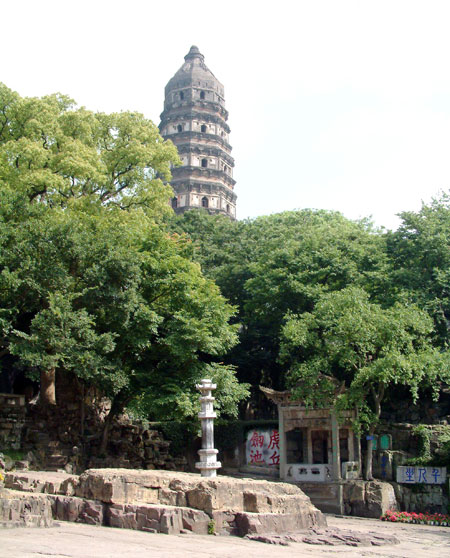Putting war to rest
Updated: 2013-03-28 00:13
By Raymond Zhou (China Daily)
|
|||||||||||
Contrary to popular belief, Suzhou's exquisite scenery embodies discordant principles and pursuits. It is the uncanny ability to blend them into harmony that created a town mellow to the extreme, Raymond Zhou reports.
On a first visit to Tiger Hill, one may well be disappointed and jump to the conclusion that Chinese poets are prone to hyperbole. "You will regret visiting Suzhou without touring Tiger Hill," wrote Su Shi, who sang the praises of so many wonderlands across China. What's there to miss? The park, at 20 hectares or 50 acres, is not much larger than some urban recreation areas. New York's Central Park is 17 times the size. True, the pagoda on Tiger Hill is showcased on many postcards, but it stands only 48 meters high, and the hill is 30 meters at the highest, so how tall can it be all together?
Suffice to say, Tiger Hill is not known for size or height. But as a microcosm of this historical city, it embodies its quirks and charms.
Some 2,500 years ago, the local king built the biggest city in Southeast China. Well, there was no unified China then. The kingdom was named Wu, after the belligerent king who conquered places as faraway as current Hubei province. But when King He Lu led an army into modern-day central Zhejiang province, just to its south, Wu was ambushed.
He died shortly afterward from the injury. Legend says he was buried under the Sword Pond, a narrow pool of water lined with steep cliffs. This is no Grand Canyon, but rather, a movie-set-like miniature ravine complete with hanging twigs and a stone archway on top.
It is rumored that as many as 3,000 swords were buried with him. For thousands of years, it has been the fascination of tomb raiders. But they have failed to locate the exact spot.
Not far from the pond lies the reason: a circular rocky platform called the Thousand Men's Rock.
When workers finished construction of the tomb, the king regaled them with food and drink. He brought the occasion to a climax by staging a crane dance.
However, the long-necked animal, a symbol of longevity, failed to appear. Instead, the audience members held out their necks like cranes, waiting impatiently, at which point a phalanx of soldiers jumped out and cut off their heads, thus sealing the secrecy of the tomb's location for posterity.
Another origin story is more benign. It claims that a monk some 800 years later used to preach here and the stony podium could hold 1,000 listeners. Modern science explains away the brownish rock as containing iron, not remnants of blood.
That He Lu guy must have been crazy about swords. Next to the steps along the path is a boulder with a neat crevice in the middle. Not surprisingly, it was supposed to be the place where the king tested his newly forged sword. He had ordered a husband-and-wife team of blacksmiths to make a pair of the weapons, and this was what they delivered - a sword that could cut a rock in half. No wonder the names of the couple are nowadays better known to ordinary people than the king's, for example, Mogan Mountain in Zhejiang province.
This reminds me of Notung, the sword Siegmund withdraws from the giant tree in the Ring of the Niebelung. Like the Nordic tale, much of the storied past about Tiger Hill, at least the part that's 2,000 years old, is shrouded in mythology. The verses and couplets we see today are mostly from the past millennium, through which more ancient history is refracted and romanticized.
Over the years, Suzhou evolved from a military power into a hub of gentle manners and sophisticated tastes.
Related Stories
Suzhou dressed in fresh green 2013-03-20 09:30
Jinji Lake Lantern Fair kicks off in Suzhou 2013-02-08 11:11
12th Lantern Festival in Guxumen, Suzhou 2013-02-07 15:22
Suzhou welcomes new national 5A tourist attraction 2013-01-30 11:03
Suzhou Pingtan worth listening to 2013-01-23 14:10
Priceless antiques exhibited in Suzhou 2013-01-23 14:00
Today's Top News
Police continue manhunt for 2nd bombing suspect
H7N9 flu transmission studied
8% growth predicted for Q2
Nuke reactor gets foreign contract
First couple on Time's list of most influential
'Green' awareness levels drop in Beijing
Palace Museum spruces up
Trading channels 'need to broaden'
Hot Topics
Lunar probe , China growth forecasts, Emission rules get tougher, China seen through 'colored lens', International board,
Editor's Picks

|

|

|

|

|

|






